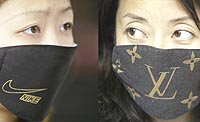Mystery disease strikes hard
news.com.au By Dirk Beveridge April 04, 2003
AS scientists scramble to unravel the mystery of severe acute respiratory syndrome, a sense of crisis is spreading even faster than the illness itself.
 Women wear designer masks in Hong Kong / AP
Women wear designer masks in Hong Kong / APPeople in Hong Kong are buying surgical masks by the thousands. Hospitals have closed in Canada, a jetliner was briefly detained and inspected in California, and the Panama Canal dispatched inspectors to check ship crews for symptoms.
A hoax that Hong Kong had been declared an "infected city" prompted panicked people to rush out and stock up on food. In Thailand, authorities turned away a French warship en route from Singapore, which has reported cases.
Economists warn it could batter Asia's economy as manufacturers temporarily shut down, consumers avoid malls and restaurants and tourists to stay away.
Severe acute respiratory syndrome, or SARS, has now sickened more than 2,200 people worldwide and killed at least 80. Some of the alerts cropping up in infected countries are real, some aren't; but fears about the disease are gaining momentum.
In Hong Kong, authorities used barricades and tape to seal 240 people inside their infected apartment building. The next night, they were put in quarantine camps.
Hong Kong has become something of a masked city, with hundreds of thousands of people putting them on around town - some sporting creative designs such as cartoon characters or bright floral patterns. The World Health Organisation recommends masks only for those in contact with victims.
"If you put on a mask but don't fasten your seatbelt in your car, that's upside down," said Dr Guenael Rodier, WHO's head of surveillance and response.
Doctors and nurses in Singapore have donned germ-warfare suits to get closer to patients.
The Geneva-based WHO warned people yesterday to avoid travel to Hong Kong and China's Guangdong province, where most of the mainland's deaths occurred. But many places have already been screening travellers.
Thailand said yesterday that nobody who appears to have SARS symptoms can enter the country, and visitors from infected areas must wear masks. Air New Zealand said some cabin crew members were refusing to fly to Hong Kong.
Schools in Singapore and Hong Kong were closed, and producers of Singapore's version of Wheel of Fortune said it had eliminated live studio audiences to avoid spreading the disease. At the Singapore Zoo, officials were no longer letting people have their photos taken next to the orangutans to avoid infecting the animals.
The first alarm sounded in February when people in southern China began stocking up on medicine, surgical masks and vinegar, which they boiled as a disinfectant to stop a mysterious disease sweeping through Guangdong province.
Health experts are increasingly focusing on a type of coronavirus - a common cause of colds - as the probable cause of SARS, but a cure may be more elusive. The WHO and the US Centres for Disease Control and Prevention say no medications have been proven effective against SARS.
Hong Kong experts are more optimistic, after gaining enormous experience with SARS cases by virtue of having dealt with so many. Health secretary Yeoh Eng-Kiong said most SARS victims can expect to recover.
Yeoh said a treatment involving the antiviral drug ribavirin and steroids is probably able to cure 95 per cent of the patients, assuming they get early treatment and don't have other bad illnesses complicating their conditions.
People in weakened condition can in fact become good hosts for the virus, making them more contagious than victims who are otherwise in better health.
"In certain people, it seems to be very, very contagious," Yeoh said.
The experts believe that the most likely method of transmission is through droplets caused by coughing or sneezing.
China yesterday acknowledged 12 more SARS deaths, for a total of 46, but critics have said Beijing was too slow in admitting what it knew. A WHO team arrived in Guangdong province today after days of awaiting government permission.
When a mainland Chinese medical professor named Liu checked into Hong Kong's Metropole Hotel on February 21 for a two-day stay, there was no reason for anybody to be alarmed as he went to his room on the ninth floor.
The professor, who had treated disease victims in China, was in Hong Kong for a wedding but got sick and died on March 4 in a local hospital.
Medical sleuths soon came across a key finding: People who had carried the disease to Vietnam, Singapore and Canada had all been on the same floor at the same time, as had a man who spread the disease to Hong Kong's Prince of Wales Hospital.
Someone then spread SARS to the Amoy Gardens apartment complex. At least 240 people in Amoy Gardens got sick.
People living in apartments 7 and 8 of many floors in one building were sickened, raising speculation that the disease was carried vertically through a sewer or drainage leak. AAP